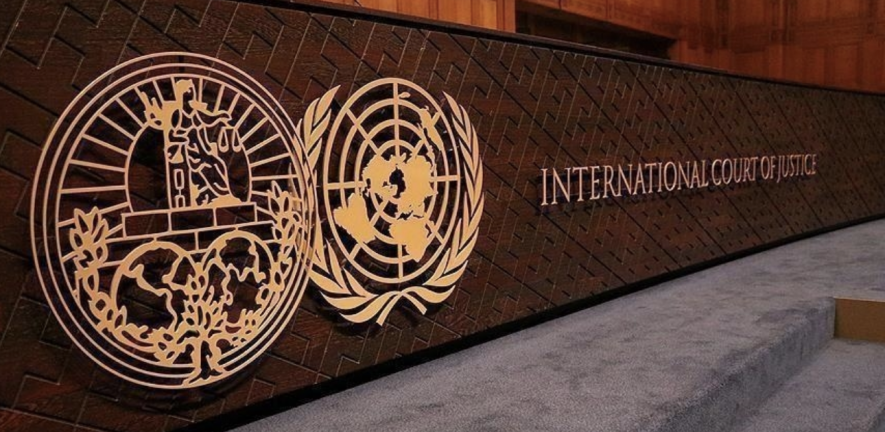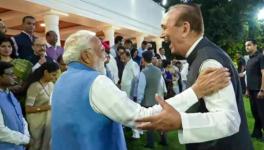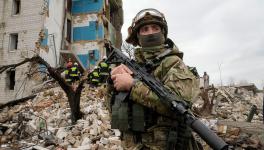As ICJ Orders Russia to Suspend its Military Operations in Ukraine, it May Well have Opened a Window for Peace

In its preliminary measures order, the ICJ has accepted most of Ukraine’s requests. Whether the ICJ order is effectively implemented or not, no one can discount the fact that Ukraine has certainly got an upper hand in the ongoing negotiations between the parties concerned.
———-
On March 16, the International Court of Justice [ICJ] gave its Order on the Provisional Measures request by Ukraine in the Allegations of Genocide under the Convention on the Prevention and Punishment of the Crime of Genocide (Ukraine vs. Russian Federation) case. As I had discussed in an earlier post on Ukraine’s submissions in the case, four preliminary measures were requested by Ukraine. These measures were:
- The Russian Federation shall immediately suspend the military operations commenced on February 24, that have as their stated purpose and objective the prevention and punishment of a claimed genocide in the Luhansk and Donetsk oblasts of Ukraine.
- The Russian Federation shall immediately ensure that any military or irregular armed units which may be directed or supported by it, as well as any organizations and persons which may be subject to its control, direction or influence, take no steps in furtherance of the military operations which have as their stated purpose and objective preventing or punishing Ukraine for committing genocide.
- The Russian Federation shall refrain from any action and shall provide assurances that no action is taken that may aggravate or extend the dispute that is the subject of this Application, or render this dispute more difficult to resolve.
- The Russian Federation shall provide a report to the Court on measures taken to implement the Court’s Order on Provisional Measures one week after such Order and then on a regular basis to be fixed by the Court.
The court has indicated the first three of these four measures. While two of the fifteen judges have voted against the first two measures, all of them have unanimously voted in favour of the third measure; albeit with some modifications (which have been discussed below). In this post, I will analyse the court’s reasoning for indicating these measures.
The ICJ has indicated the first three of the four measures demanded by Ukraine. While two of the fifteen judges have voted against the first two measures, all of them have unanimously voted in favour of the third measure; albeit with some modifications
Also read: Imperialism of our times: understanding the Russian war on Ukraine
On Russia’s non-participation during the oral proceedings
As I had mentioned in an earlier post, Russia had decided to not participate in the Oral Proceedings on March 7 and 8 on the ground that “it would be difficult, if not impossible, to take all necessary decisions regarding the participation in the proceedings and conduct proper analyses of the Request in five working days”. However, subsequently, Russia submitted a document which sets out its position regarding the alleged “lack of jurisdiction” of the court in the case. (For an analysis of this document, see here.) Despite expressing regret over Russia’s non-participation, the court took “account of the document communicated by the Russian Federation on March 07, 2022 to the extent that it finds this appropriate in discharging its duties”. (para 22) The court underscored the negative impact of non-appearance of a party in the administration of justice. (para 21)
Non-appearance is certainly an exception at the ICJ. Famously, in the past, Tehran, in the United States Diplomatic and Consular Staff in Tehran (United States of America vs. Iran) case and Washington, D.C., in the Military and Paramilitary Activities in and against Nicaragua (Nicaragua vs. United States of America) case, had not appeared in the proceedings before the ICJ. In these situations, the court is placed in a precarious position; while it has to try and understand the view-point of the non-appearing side, it must also not go out of its way in doing so in order to not put the appearing side in a position of disadvantage. The court thus noted in the US Diplomatic and Consular Staff in Tehran case:
“The Court has thus to strike a balance. On the one hand, it is valuable for the Court to know the views of both parties in whatever form those views may have been expressed. Further…where one party is not appearing “it is especially incumbent upon the Court to satisfy itself that it is in possession of all the available facts”.” (para 31, p. 15)
Regarding the communications received by the non-appearing party, the court in the same judgment noted that:
The treatment to be given by the Court to communications or material emanating from the absent party must be determined by the weight to be given to these different considerations, and is not susceptible of rigid definition in the form of a precise general rule. The vigilance which the Court can exercise when aided by the presence of both parties to the proceedings has a counterpart in the special care it has to devote to the proper administration of justice in a case in which only one party is present.” (para 31, p. 16)
Citing this authority, the court, in the current case, decided to engage with Russia’s document submitted to it on March 7.
Also read: Sanctions against Russia explained – a deterrent or a whitewash?
On jurisdiction
Ukraine had invoked the court’s jurisdiction under Article IX of the 1948 Convention on the Prevention and Punishment of the Crime of Genocide. The text of the Article provides:
“Disputes between the Contracting Parties relating to the interpretation, application or fulfilment of the present Convention, including those relating to the responsibility of a State for genocide or for any of the other acts enumerated in article III, shall be submitted to the International Court of Justice at the request of any of the parties to the dispute.” (Emphasis supplied)
The requirements under this Articles are that, firstly, the disputants have to be a ‘contracting party’ to the Convention; secondly, there has to a dispute between the said contracting parties and; thirdly, that the said dispute should be relating to the interpretation, application or fulfilment of the Convention. All these three requirements had to be satisfied for the court to have jurisdiction in this case.
The court noted in its order that both the countries, Ukraine and Russian Federation, are parties to the Convention. (para 27) Subsequently, it concluded that there is a ‘dispute’ between the parties, and that the dispute is relating to the interpretation, application or fulfilment of the Genocide Convention.
On dispute
Ukraine’s claim was that Russia is falsely accusing it of committing genocide and is on that pretext attacking it, under the guise of ‘prevent and punish’ provision of Article I of the Convention. Russia, on the other hand, argued that its actions amount to ‘use of force’ under the United Nations [UN] Charter. The court, however, decided to rely on the statements made by Russian officials and other State agents to conclude that Russia indeed was claiming genocide in the Luhansk and Donetsk regions of Ukraine. It thus noted that the dispute is about interpretation, application or fulfilment of the present Convention. It noted that:
“…while it is not necessary for a State to refer expressly to a specific treaty in its exchanges with the other State to enable it later to invoke the compromissory clause of that instrument to institute proceedings before the Court…the exchanges must refer to the subject-matter of the treaty with sufficient clarity to enable the State against which a claim is made to ascertain that there is, or may be, a dispute with regard to that subject-matter.” (para 44)
It therefore concludes that:
“The statements made by the State organs and senior officials of the Parties indicate a divergence of views as to whether certain acts allegedly committed by Ukraine in the Luhansk and Donetsk regions amount to genocide in violation of its obligations under the Genocide Convention, as well as whether the use of force by the Russian Federation for the stated purpose of preventing and punishing alleged genocide is a measure that can be taken in fulfilment of the obligation to prevent and punish genocide contained in Article I of the Convention. In the Court’s view, the acts complained of by the Applicant appear to be capable of falling within the provisions of the Genocide Convention.” (para 45) (emphasis supplied)
While I agree with the Court’s conclusion that the parties disagree about the commission of genocide, I cannot agree with the second conclusion. In the second conclusion, as highlighted above, the court holds that the parties disagree as to ‘whether the use of force by the Russian Federation for the stated purpose of preventing and punishing alleged genocide is a measure that can be taken in fulfilment of the obligation to prevent and punish genocide contained in Article I of the Convention’. My reasons for disagreement are straightforward: the Russian response is totally outside the Convention, that is, its use of force is not to ‘prevent and punish’ under the Convention, but under the UN Charter. Therefore, as per my reading of the submissions, the dispute is not under Article I of the Convention and hence, the ‘dispute’ requirement of Article IX of the Convention is not fulfilled.
Also read: Russia-Ukraine conflict: has international law failed?
On preliminary measures
In the penultimate part of the order, the court lists out the requirement for it before giving an order on Preliminary Measures. It refers to Article 41 of its Statute and notes that “the power of the Court to indicate provisional measures will be exercised only if there is urgency, in the sense that there is a real and imminent risk that irreparable prejudice will be caused to the rights claimed before the Court gives its final decision”. (para 66) Noting the “loss of life, mental and bodily harm, and damage to property and to the environment”, the Court decided to award Preliminary Measures in the case. It subsequently indicated the first three provisional measures requested, but decided to not indicate the fourth one without giving reasons. However, as mentioned earlier, the Court significantly modified the three measures it did indicate.
While the first requested measure was that ‘The Russian Federation shall immediately suspend the military operations commenced on 24 February 2022 that have as their stated purpose and objective the prevention and punishment of a claimed genocide in the Luhansk and Donetsk oblasts of Ukraine’, the Court indicated that ‘The Russian Federation shall immediately suspend the military operations that it commenced on 24 February 2022 in the territory of Ukraine’.
The second requested measure was that ‘The Russian Federation shall immediately ensure that any military or irregular armed units which may be directed or supported by it, as well as any organizations and persons which may be subject to its control, direction or influence, take no steps in furtherance of the military operations which have as their stated purpose and objective preventing or punishing Ukraine for committing genocide’, but the Court indicated that ‘The Russian Federation shall ensure that any military or irregular armed units which may be directed or supported by it, as well as any organizations and persons which may be subject to its control or direction, take no steps in furtherance of the military operations referred to in point (1) above’.
Notice (read the italicized parts above) how the requested measures were linked to the Convention, and specifically to the ‘prevent and punish’ clause. The indicated measures, however, have removed the link. This, after the court has established that the dispute is regarding the Convention. This is even more surprising since the very name of the case – Allegations of Genocide under the Convention on the Prevention and Punishment of the Crime of Genocide (Ukraine vs. Russian Federation) – includes the full title of the Convention.
The third requested measure was that ‘The Russian Federation shall refrain from any action and shall provide assurances that no action is taken that may aggravate or extend the dispute that is the subject of this Application, or render this dispute more difficult to resolve’, but the Court indicated ‘Both Parties shall refrain from any action which might aggravate or extend the dispute before the Court or make it more difficult to resolve’.
Here, while the measure requested for asking Russia to refrain, the indicated measure includes both the parties.
The court has the power to indicate measures other than those requested. Article 75 of the Rules of the ICJ provides that:
“When a request for provisional measures has been made, the Court may indicate measures that are in whole or in part other than those requested, or that ought to be taken or complied with by the party which has itself made the request.”
Exercising this power, the Court has amended the first three requested measures. The impact of these amendments will become clear if the case proceeds to the Merits stage.
Also read: International Law violations by Russia in its invasion of Ukraine
On Declarations and Separate Opinion
Five of the judges have given Declarations, including the judge ad-hoc, and one judge has given a separate opinion. In his Declaration, ICJ Vice-President Kirill Gevorgian argues that the Court doesn’t have jurisdiction under the Convention. He therefore disagrees with the first two measures and had voted against them. He has, though, voted in favour of the third measure, which calls for both the parties to deescalate, and has explained such voting by noting, “The power to indicate such measure is a power inherent to the Court, and not necessarily linked to the Court’s prima facie jurisdiction over the parties’ substantive rights or obligations on the merits of a case”. (para 10)
Judge Mohamed Bennouna in his Declaration disagrees with the Court’s finding that there is a right under the Convention which has been violated by the Russian Federation. Similar views are expressed by Judge Xue Hanqin in her Declaration. She also claims that the order “prejudges the merits of the case (see paragraphs 56-59 of the Order)”. Judge Georg Nolte, on the other hand, has argued in his Declaration that the court does have jurisdiction. He does so by differentiating the current case from other cases where the court found that it lacked such prima facie jurisdiction. He focuses primarily on the Legality of Use of Force (Serbia and Montenegro vs. Belgium) case to support his argument.
The Russian response is totally outside the Genocide Convention, that is, its use of force is not to ‘prevent and punish’ under the Convention, but under the UN Charter. Therefore, as per my reading of the submissions, the dispute is not under Article I of the Convention and hence, the ‘dispute’ requirement of Article IX of the Convention is not fulfilled.
Finally, the Declaration by Judge Ad-Hoc Yves Daudet regrets that the court has amended the third measure by including Ukraine. He states, “In my view, this measure of non-aggravation of the dispute should have been directed solely at the Russian Federation, which I recall was designated by the United Nations General Assembly as the perpetrator of aggression against Ukraine”. This view is supported by Judge P.L. Robinson in his Separate Opinion. He notes that there is “no justification” for directing the third measure to Ukraine and that it should have been directed solely to the Russian Federation. He also considers it “regrettable” that the court did not grant the fourth measure requested by Ukraine, since “it would have been advantageous for the Court to examine periodic reports by Russia on its implementation of the provisional measures and to make appropriate orders”.
It remains to be seen what is going to be the efficacy of the order. Russia might as well decide not to follow the order, though one hopes that it does, considering the number of lives at stake. In the past, when the USA decided not to participate in the Nicaragua v. USA case and a judgment was given against it in which it was asked to pay compensation (although that was at the ‘Merits’ stage, while the current proceeding is at the ‘Preliminary Measures’ stage), it had vetoed UN Security Council resolutions which aimed at effective implementation of the judgment. Subsequently, both the parties settled the dispute. In the current case, the possibility of Russia following the USA’s path is a little improbable.
Judge Xue in her declaration sounded sceptical about the preliminary measures indicated in the order. She noted that “in the context of an armed conflict, one may wonder how those provisional measures can be meaningfully and effectively implemented by only one Party to the conflict. When the situation on the ground requires urgent and serious negotiations of the Parties to the conflict for a speedy settlement, the impact of this Order remains to be seen.” (para 6) However, since the attack started from the Russian side, it is only obvious that Russia be asked to stop its military actions.
Whether the order is effectively implemented or not, no one can discount the fact that Ukraine has certainly got an upper hand in the ongoing negotiations between the parties concerned. To add to the list of soft law international instruments (like the UN General Assembly Resolution from earlier this month) criticising Russia’s actions, Ukraine now has an order by the ICJ asking Russia to immediately suspend its military operations.
(The views expressed are personal.)
Get the latest reports & analysis with people's perspective on Protests, movements & deep analytical videos, discussions of the current affairs in your Telegram app. Subscribe to NewsClick's Telegram channel & get Real-Time updates on stories, as they get published on our website.
























